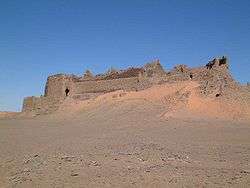Ksar
Ksar or qsar (Maghrebi Arabic: قصر qṣer, plural qṣur; Berber: ⵉⴴⵔⵎ aghrem or ighrem, plural: igherman), plural ksars, qsars, ksour or qsour, is the North African term for "fortified village," from Arabic qaṣar (قَصَر), itself possibly loaned from Latin castrum. The term generally refers to a Berber fortified village.
.jpg)
Related terms
The origin of the Maghrebi Arabic term qsar is qaṣar (قَصَر) in Standard Arabic, which means "castle" or "palace";[1] this term is also found elsewhere in the Muslim world. See, for example, the Iberian alcázar.
The Berber (Amazigh) original word for "ksar" used in North Africa by the Berber-speaking populations is aghrem (singular) or igherman (plural). In the Maghreb, the term has a more general meaning of "fortified village," or "fort". The Berber word igherman might be a cognate word, with an identical meaning, with the word Garamantes, which is the name of the ancient Berber city-states in modern-day Libya.
Architecture
Ksour in the Maghreb typically consist of attached houses, often having collective ghorfa (granaries) and other structures like a mosque, bath, oven, and shops. Ksour / igherman are widespread among the oasis populations of North Africa. Ksars are sometimes situated in mountain locations to make defense easier; they often are entirely within a single, continuous wall. The building material of the entire structure is normally adobe, or cut stone and adobe. The idea of the ksar as a granary is a confused notion of two things, the granary itself, found within a ksar, and the ksar, which is a village, normally with granaries within it. Ksars form one of the main manifestations of Berber architecture.
Places named Ksar
The word is part of place names across Morocco, Algeria, and Tunisia, — the region called the Maghreb; and is particularly prevalent on the Saharan side of the various ranges of the Atlas Mountains and the valley of the Draa River.

- Ksar es-Seghir, Moroccan stronghold in the Straits of Gibraltar, between Tangier and Ceuta
- Ksar el-Kebir, location of the Battle of Alcácer Quibir, influenced Moroccan, Portuguese and Spanish history
- Ksar Nalut, Libya
- Ksar Ouled Soltane, Tunisia
See also
- List of ksour in Tunisia
- Ghorfa
- Alcázar (also Alcácer or Alcasser)
- Ribat
- Maghreb placename etymology
References
- Wehr, Hans; Cowan, J. M. A Dictionary of Modern Written Arabic (Third ed.). Ithaca, N.Y.: Spoken Language Services. p. 768.
External links
| Wikimedia Commons has media related to Ksour. |
- www.ksour-tunisiens.com – complete documentation of all ksour of southern Tunisia, Herbert Popp & Abdelfettah Kassah

